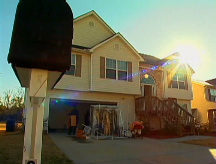Housing prices post record declines
Las Vegas, Miami and Phoenix all saw prices plummet by at least 20%. And so far, there is no sign of a bottom.
NEW YORK (CNNMoney.com) -- Home prices have posted another record decline, as most of the nation's largest markets suffered double-digit drops over last year, a survey released Tuesday shows.
The S&P Case/Shiller Home Price Index, which tracks 20 of the largest housing markets, showed prices plummeting by 12.7% in the 12 months ending February. That's the biggest fall since the index began tracking prices in 2000.
Of those 20 metro areas, 17 posted their largest year-over-year declines ever. Ten of the 20 cities posted double-digit dips.
The 10-city Case/Shiller index is down 13.6% year-over-year, the biggest drop since its launch in 1987.
"There is no sign of a bottom in the numbers," S&P spokesman David M. Blitzer, said in a prepared statement. "Prices of single family homes continue to drop across the nation."
"This is huge," said Dean Baker, co-director of the Center for Economic and Policy Research. "Back a couple of years ago, people were saying, 'Housing prices are not like stocks; they change slowly,'" he said.
But the drop in home prices appears to be accelerating. Indeed, Baker said that at the rate prices are falling, as much as $6 trillion in home values could be wiped out from the top of the market in June, 2006, through the end of this year.
Prices in the Las Vegas metro area have plunged more than any other city, down 22.8% over the 12 months through February. Miami prices plummeted 21.7%. In Phoenix, they've fallen 20.8%.
Of the 20 cities Case/Shiller tracks, only Charlotte, N.C. showed higher prices, up 1.5% over the 12-month period.
Other metro areas recorded only modest price declines, including Portland, Ore., down 2.0%, Seattle, off 2.7% and Dallas, 4.1%. In the nation's largest city, New York, metro area prices dropped a modest 6.6%.
The declines create a vicious cycle, according to Peter Schiff, the president of the investment firm Euro Pacific Capital. He was sounding alarms about the housing bubble more than two years ago.
As housing price losses extend, he said, the fall-off in demand for homes will deepen. And Schiff expects to see a national price decline of 30% - and by as much as 50% in the worst hit markets.
"People wanted houses as vehicles to make money," said Schiff. "Now that they can't make money, they don't want the houses anymore."
The S&P Case/Shiller statistics come on the same day as news that foreclosures spiked 112% in the first quarter, according to RealtyTrac, which said that more than 155,000 homes have been lost to foreclosures so far this year.
This flood of foreclosed homes onto the market is putting even more downward pressure on home prices.
On Monday, the Census Bureau reported that the number of vacant homes for sale has hit a record high. The report shows that 2.9% of U.S. homes -- excluding rental properties -- were vacant and up for sale in the first quarter. That translates to about 2.28 million properties - the highest quarterly number on record since 1956.
The number of vacant houses on the market is especially troubling, according to Pat Newport, a housing economist with Global Insight, a consulting firm. "I'm not surprised [by the record price declines], given the inventory numbers that came out yesterday," he said.
He called the vacancy statistic "the best measure of excess supply."
Many of these properties are owned by very motivated sellers, builders, banks and speculators who want to sell as quickly as possible in order to avoid having to pay to maintain them.
That's going to make these owners willing to take substantial losses just to get the homes sold. "It means prices will have to drop a lot more," Newport said. ![]()



